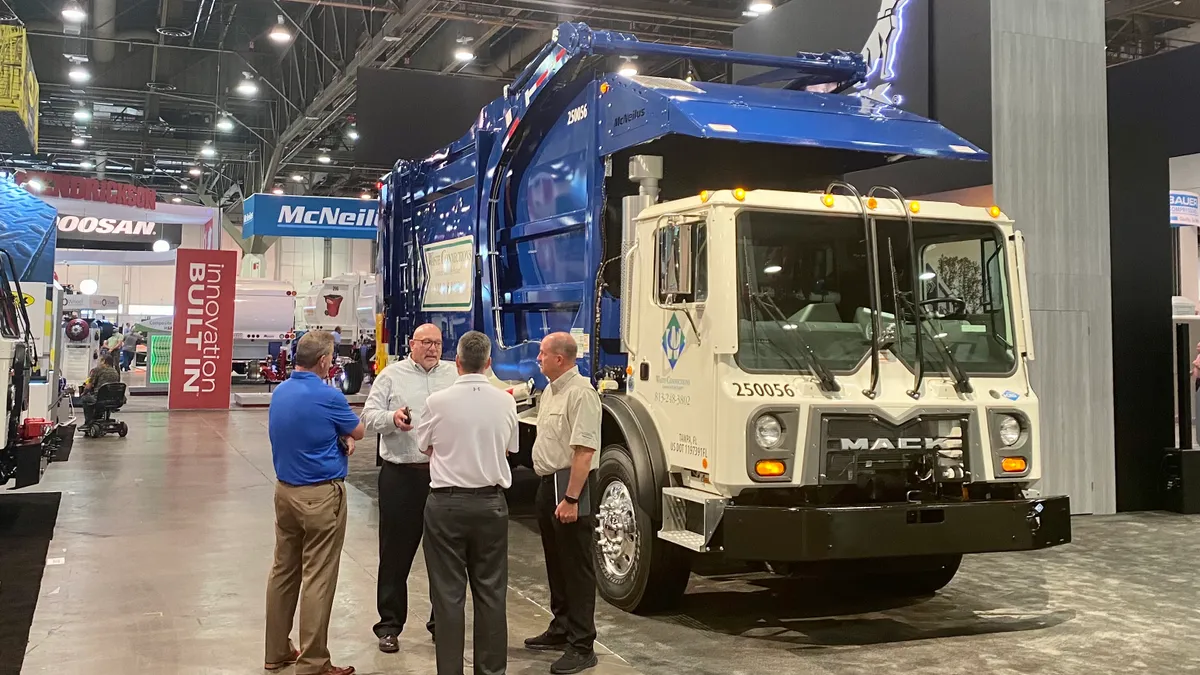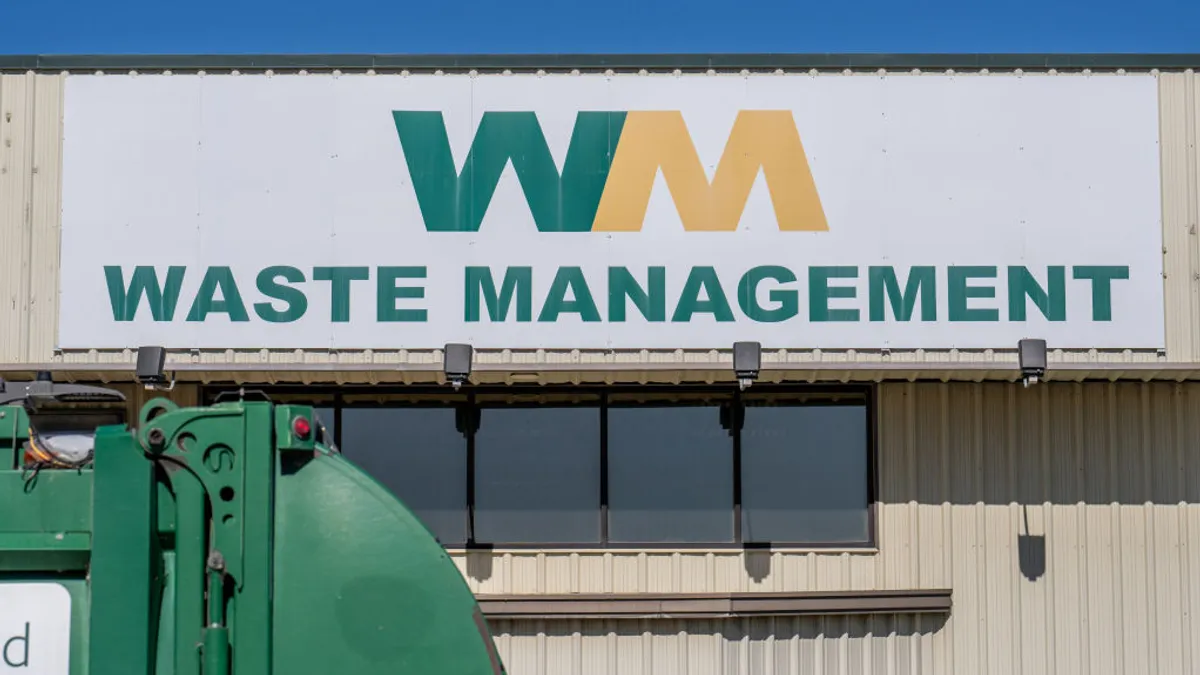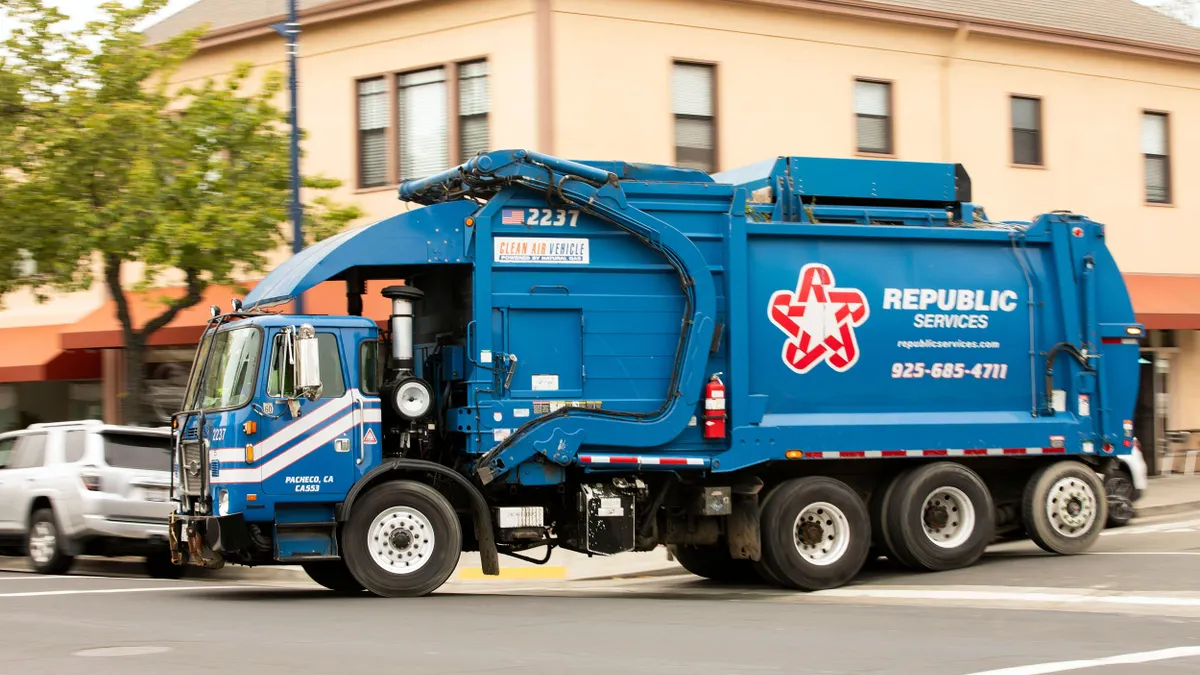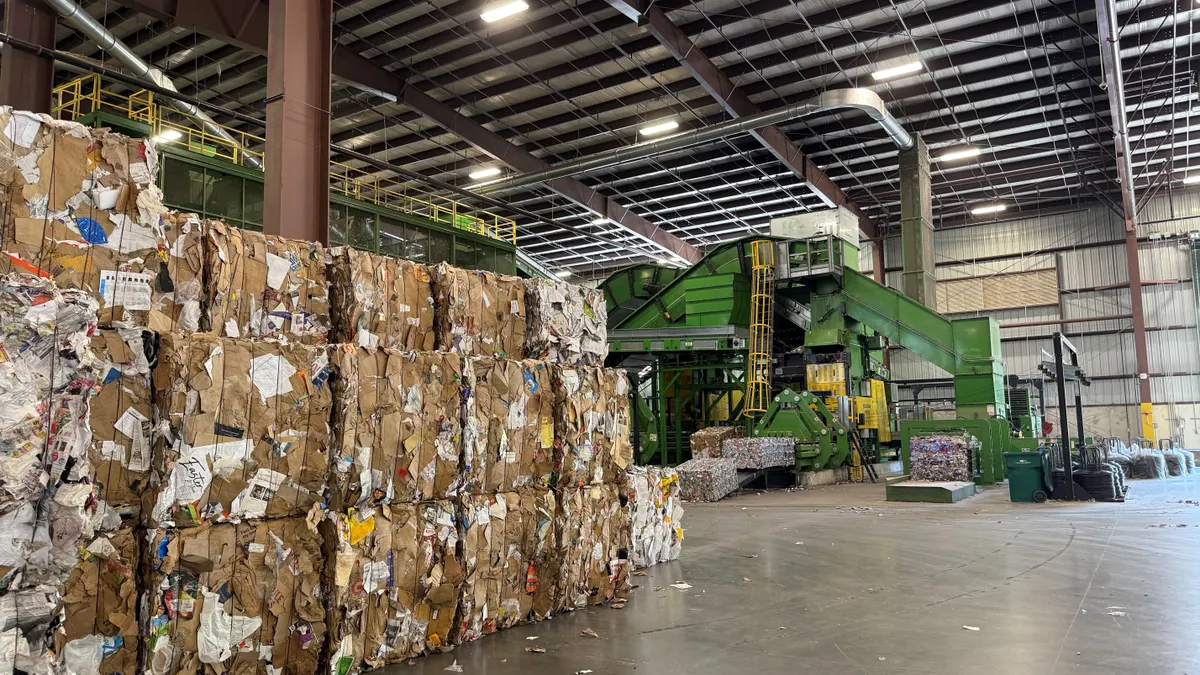Virtual events, webinars, earnings calls and the like have offered waste and recycling industry participants numerous chances to connect and share updates and insights throughout the pandemic. WasteExpo attendees welcomed the opportunity to do so in person as part of a smaller-than-usual — but still thousands-strong — crowd in Las Vegas.
The Waste Dive team was there to hear from industry leaders, innovators and government officials in panel sessions, Q&As and one-on-one interviews. What did conference participants say about policy and regulations, recycling, PFAS, fleets and technologies, and labor and safety? We've rounded up some perspectives from the week below.
Policymaking
From handling organics to extended producer responsibility, state and federal laws and regulations are top of mind.
“The devil is in the details on any bill. I've never seen any policy work exactly perfectly the first time out of the gate, whether it was EPR or anything else.” — Heidi Sanborn, founding director of the National Stewardship Action Council
“Congress, industry, nonprofits, the international community and the American public all want to see an improved recycling sector, and there is state legislative action and congressional action the likes of which we have not seen in a long time.” — Nena Shaw, acting director of the Resource Conservation and Sustainability Division at U.S. EPA
“I've been working in this industry for about 30 years, and I've never seen as much movement towards collaboration amongst individuals in our industry to work towards a national recycling policy.” — Michelle Leonard, senior vice president and national expert in solid waste planning & recycling and sustainability at SCS Engineers
“There’s no doubt there will be more regulation.” — Michael Timpane, principal and vice president of process optimization and material recovery at RRS. Timpane named different brand priorities as one factor that has slowed the pace of change in this area. “The fastest way to spike the recovery rate is to have more regulation.”
Recycling
Recycling is just one strategy for achieving a circular economy, and improvements to recycling infrastructure, access and education are some of the methods that can help mitigate the effects of climate change, attendees said.
“Recyclability is an important function, but the most important function is protecting the product." — Chaz Miller, longtime industry professional and Waste360 columnist. “We’ve gotten so obsessed with recycling as the ultimate we’ve forgotten there are other attributes of a product and other things on the hierarchy."
“Recycling is one of the fastest, easiest, most cost-effective things we can do at the local level to affect climate change." — Kate Bailey, policy and research director at EcoCycle. “We alone as an industry are not going to solve climate change, that’s fair, but we need all solutions at the table."
“Walking down the Strip in Las Vegas, you look at the trash cans and they're all filled with this good plastic that’s really high-value right now, so it's really disappointing to see that. Having access to recycling is really important. But it also starts with the packaging and what people put on the shelf, making sure those materials are easy to recycle.” — Brent Bell, vice president of recycling at Waste Management
“Nobody asks whether the wastewater treatment plant makes money. They're supported by tax dollars. I think it's a fallacy to assume that somehow recycling has to make money. It's expensive, but it’s popular, which is what we discovered both in the aftermath of National Sword and COVID.” — JD Lindeberg, principal and president at RRS
"I think we're pivoting to discussing recycling and sustainability the way we were before COVID, when that was probably the No. 1 topic on people's minds. The situation's significantly different now than it was in early 2020." — David Biderman, CEO at SWANA, citing higher commodity prices and rising federal interest in recycling. "Recycling and PFAS are the two topics that are going to get a lot of play as the pandemic recedes."
PFAS
Waste and recycling professionals said they're not sure how possible future regulations related to per- and polyfluoroalkyl substances (PFAS) might affect their operations, but they see themselves as part of the conversation— or possibly part of the solution.
“What we cannot do yet is destroy it, [but] we can absolutely get this out." — Michael E. Hoffman, managing director at Stifel, about the industry’s perspective on PFAS. “I think the garbage industry, at a minimum, is a long-term intermediate solution."
“So you're going to see more and more that things do not get done in Washington. I think you're going to see the states come in and fill those gaps with different kinds of PFAS legislation instead.” — Dan Jameson, vice president of government and regulatory affairs at Republic Services
Fleets and technologies
Technologies for enabling digitization, route optimization, safety tracking and fleet development have been around for years. But the necessity to adopt, integrate and embrace those tools has been a moving target. Conference participants discussed that recent evolution.
“Technology has actually reached the waste industry." — Sam Keenan, vice president at Kinderhook Industries, describing it as a way for companies to improve their valuations but also an area to be smart about because “the data is only as good as you put into it."
“We used to talk about landfills and post-collection being the moat. I think digital is becoming the new moat.” — Jon Vander Ark, CEO of Republic Services, on the substantial investments needed to modernize company operations
“I think there was a measurable shift in the way that waste generators are thinking about quantifying their environmental impacts. And that started in 2019 and has only continued to build through the pandemic, through this year.” — Jason Gates, CEO of Compology, on changes in business engagement from waste generators
"I remember 24 months or so ago, a hot topic was also autonomous [vehicles]. And that's still a topic but not near as prevalent as electrification." — Jonathan Randall, senior vice president of sales and commercial operations at Mack Trucks
Labor and safety
Hiring and retaining workers was a challenge prior to the pandemic, but many at the conference said it's even harder to do so now. At the same time, the industry continues to grapple with its ranking as among the deadliest in the country.
“The topic of safety is being taught very differently post-pandemic. Mental health and physical safety are now kind of being talked about as equally important, versus, you know, not wanting to talk about the mental health piece." — Shwetha Kurvey-Mishra, vice president of organizational and talent management at Waste Management
"Drivers aren't stupid. ... They want a good place to go to work. They want to be treated with respect and they want to have the right culture to go work within.” — Patrick Dovigi, CEO of GFL Environmental
“During the pandemic, there was so much focus on COVID and caring for our people that we actually saw an improvement in a lot of our safety metrics. So it's a good reflection for us all to think about — what were some of the behaviors we were doing during this pandemic that led to that, and hopefully those are some things that we can continue doing.” — Amanda Mickelson, vice president of human resources at McNeilus Truck & Manufacturing
“They really are creating pressure for big business and small business alike.” — Jim Fish, CEO of Waste Management, discussing enhanced unemployment benefits. “We're seeing that the pool is greatly limited, and people now have an added option, which is they can join the workforce or they can choose to stay unemployed. We've seen it with with employees who have decided to leave the company as well."


















